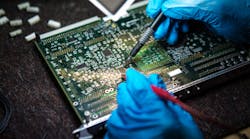Samsung said that it would invest more than $115 billion by 2030 in an effort to expand its share of the contract chip manufacturing market dominated by TSMC and take over more of the computer processor space from Qualcomm and Intel, among others. Samsung is trying to bolster its semiconductor division, its most profitable unit, during a dip in the smartphone’s market growth.
The spending is part of a broader plan to become the market leader in both memory and logic chips by 2030. While $63.1 billion is for boosting research and development, $51.9 billion is for upgrading its chip production plants. Samsung said that on average it would spend around $9.5 billion per year from 2019 to 2030. The company also plans to create 15,000 jobs in research, development and production as part of the effort.
The investment is intended to reduce Samsung’s reliance on the memory chip market. As demand for NAND and DRAM used in phones, personal computers, data centers, and other devices has dropped, prices have plunged. Samsung recently reported that its operating income had slipped 60% in the first quarter of 2019 to $5.5 billion. Semiconductor sales account for around 75% of the conglomerate's operating profit.
The company's targets in the semiconductor space include Qualcomm, which competes against Samsung's Exynos product line in the market for smartphone chips. The global market for non-memory chips climbed to $311.8 million last year, compared with $162.8 billion for memory, according to Gartner. Samsung's foundry unit is also trying to loosen TSMC’s dominance in the business of building chips designed by other corporations.
Samsung is aiming to lessen TSMC’s lead in the more than $60 billion made-to-order chip market. Producing the most advanced processors, like 7-nanometers and 5-nanometers, is an increasingly expensive effort. Excessive costs forced rival Globalfoundries out of the market for chips using 7-nanometer technology. Intel lost both its chip manufacturing lead to TSMC and its top spot in global semiconductor sales to Samsung last year.
Samsung plotted its plan as the semiconductor industry grapples with the end of Moore's Law, which has pushed the production of smaller, faster and cheaper computer chips for decades. R&D costs are climbing as companies struggle to get around the challenges facing advanced chip production. R&D spending is projected to rise 5.5% annually from 2018 through 2023 versus 3.6% from 2013 to 2018, according to IC Insights.
TSMC, which holds nearly half of the contract chip manufacturing market, expects to spend slightly more than Samsung on research, development and production in 2019. The company’s budget is expected to be between $10 billion and $11 billion. It will cost more than $17 billion to build its latest production plant, Fab 18, which will churn out chips using 5-nanometers. Gartner estimates that the foundry market will reach $85 billion by 2022.
Samsung currently has the chip industry’s largest capital spending budget. Last year, the company burned through $22.6 billion of capital expenses, according to IC Insights. That total was roughly 45% more than Intel's, which came in second at $15.5 billion in 2018. Samsung, which is also the No.1 smartphone manufacturer in the world, has started to cut capital spending on memory chips as DRAM and NAND demand drops.
